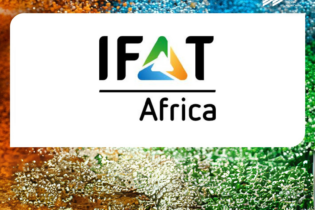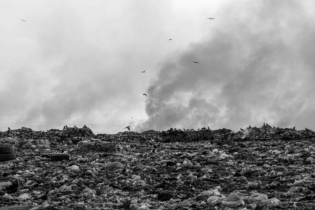Reaching its 20-year milestone, Desco Electronic Recyclers has made strides in the e-waste industry, setting benchmark standards in the education and recycling of electronic waste products in South Africa. Processing 5 500 t of e-waste in 2011 – an impressive 62% volume increase from 2010 – Malcolm Whitehouse, sales manager at Desco, talks about the company’s history and shares itsrecipe for success.
Q. When was the company formed and by whom? Why was the company formed? A. The company was formed in 1992 by Costa Airaga and his wife Desiree. It is a family business that was based on the opportunity in recycling electronic waste identified by the founder. Initially, emphasis was placed on printed circuit boards, because there were many more mainframe computers in service that contained high-quality printed circuit boards. The main thrust of the business in the early days was based on the recovery of precious metals, but as time passed it became more and more apparent that a fully fledged, sustainable one-stop electronic waste (e-waste) recycling service was a better alternative. Further research resulted in developing the recovery operation so that all of the basic components found in modern electronic equipment could be recycled responsibly. In those early days, when e-waste recycling was practically unheard of, developing and establishing the business presented challenges and frustrations, with the fact that glass, paper and tin cans were commonly recycled and very few South Africans had heard the term e-waste or electronic waste. It demanded tenacity of purpose to make Desco the leader of this industry in South Africa. We strive to offer our valued clientele a free service that coupled to security, integrity, trust and professionalism. This we have achieved through our business model in which the standard of leadership, people, policy, strategy, partnerships, resources and processes all contribute to excellence. Our adherence to all legislative requirements, standards, certification and continued improvement in our processes contribute to Desco remaining at the forefront of successful e-waste recycling in South Africa. Q. From an industry perspective, what are the laws/regulations governing the recycling of e-waste in South Africa? A.Desco adheres to the following environmental laws and regulations:- A Section 20 permit (Section 20 of Act 73 of 1989 as amended) of the Environment Conservation Act, which allows storage on site of e-waste for more than 90 days, as well as authority to operate a recycling facility on said site. (This is soon to be superseded by the National Environmental Management Act.)
- The Second Hand Goods Act (No6 of 2009), which dictates the relevant rules and regulations of recycling, reprocessing and dealing in scrap metals (related also to e-waste).
- A localised permit from the Gauteng Department of Agriculture and Rural Development to operate a waste reprocessing facility.
- Various transport waste hub permits related to the hazardous nature of e-waste.
- Hazchem legislation pertaining to certification of vehicles and drivers.
- The Consumer Protection Act(No 68 of 2008), which is applicable to retailers or resellers of equipment, as well as importers or manufacturers of OEM equipment.
- –A Precious Metal Refiners licence.
Builders 1 Strubens Valley
Schools 6 Schools in Gauteng Shopping malls 2 in Gauteng: Kolonnade and Northgate – in conjunction with Incredible Connection Universities 2 in Gauteng Other 2 in Gauteng Agencies Nelspruit, Durban, East London, Polokwane, Port Elizabeth, George, Cape Town, Bloemfontein, Kimberley, Rustenburg, Vanderbijlpark, Klerksdorp. For your convenience, there is an online Google map on our website depicting all the collection or drop–off points. Book a Collection is a service whereby anyone requiring an e-waste collection from Descoonly needs to fill in the form on the website. This form is then sent to the logistics coordinator. He will make contact and arrange the collection. Typically, one of the criteria for the collection is that a 1 t capacity bakkie load or more qualifies for a FREE collection and disposal service. The form is very comprehensive in terms of what information Desco requires in order to schedule a free collection service. All mandatory fields as well as other fields should be completed to ensure an efficient service. Visit www.desco.co.za for this form. Q. What have been Desco’s collection and recycling statistics from 2010 as compared to 2011? Is there an increase in electronics recycling or are more awareness programmes still required? A. During 2010 Desco processed a total of 3 400 t of e-waste and during 2011 we processed 5 500 t of e-waste. This amounts to an increase in volume of 62% year-on-year. Although it is a significant increase in volume, there is still a need for more awareness creation programmes and education regarding the importance of e-waste recycling. Q. What is your comment on the illegal shipments of e-waste to Africa? Why is there such a demand for electrical and electronics equipment in Africa? A. This is a practise that a lot of developed countries are using to try and address the problem around the digital divide. Unfortunately, this has exacerbated the problem of disposing of redundant and end-of-life electrical and electronics equipment in the developing nations in Africa. Electronic goods were or are exported to Africa under the ‘pretext’ of second-hand equipment. Unfortunately most countries on the receiving end of this scrap do not have the skills, knowledge or infrastructure to deal responsibly with it. This has resulted in widespread malpractices. Typically, the ‘feel good’ objective has turned into a nightmare for the governments of the countries concerned. People living in a developing country have the same dreams and aspirations as those who have the best of everything at their fingertips in the developed countries. There is, therefore, a hunger, as well as a huge demand for these goods, which fuels the problem for viable and sustainable recycling and disposal solutions. This problem will continue for many generations to come. Q. Informal e-waste is growing in countries such as Nigeria and Ghanaande-waste contains many different substances, most of which are toxic. What are some ofthe environmental and health hazards surrounding e-waste? What is Desco’s compliance in this regard? A. The main hazardous materials found in electronics devices are:- lead
- mercury
- beryllium oxide
- cadmium
- lithium
- brominated flame retardants (plastic computer casings)






